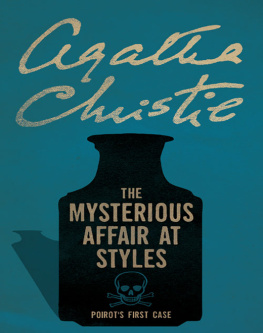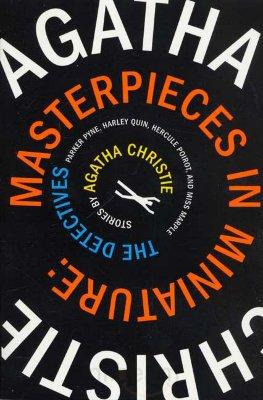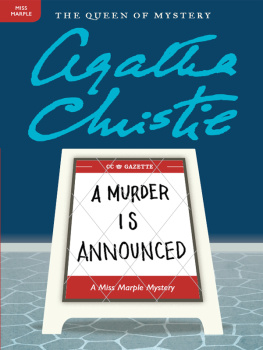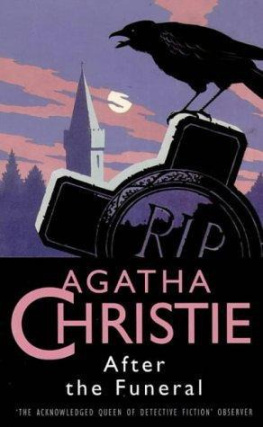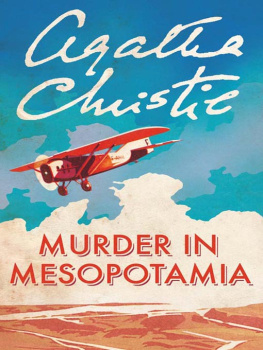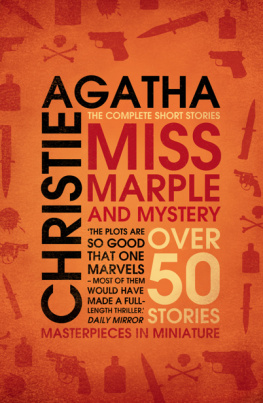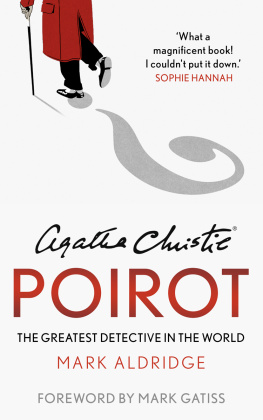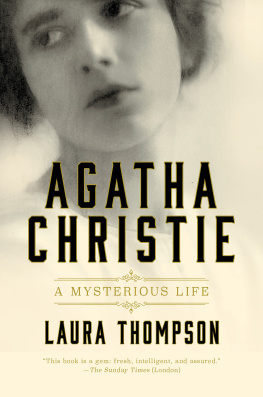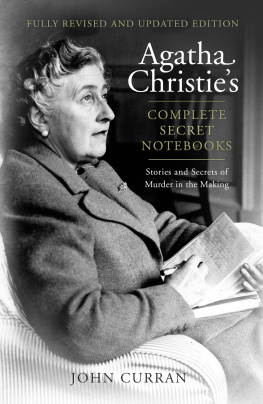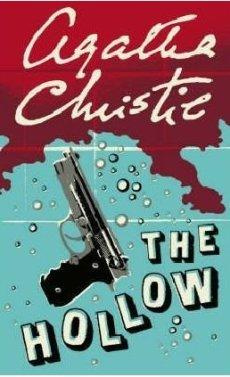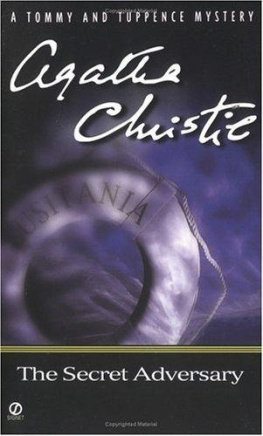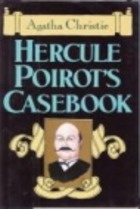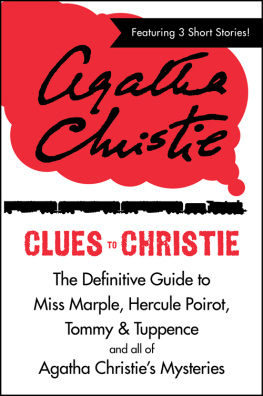Agatha Christie - The Capture of Cerberus
Here you can read online Agatha Christie - The Capture of Cerberus full text of the book (entire story) in english for free. Download pdf and epub, get meaning, cover and reviews about this ebook. year: 2009, publisher: HarperCollins, genre: Detective and thriller. Description of the work, (preface) as well as reviews are available. Best literature library LitArk.com created for fans of good reading and offers a wide selection of genres:
Romance novel
Science fiction
Adventure
Detective
Science
History
Home and family
Prose
Art
Politics
Computer
Non-fiction
Religion
Business
Children
Humor
Choose a favorite category and find really read worthwhile books. Enjoy immersion in the world of imagination, feel the emotions of the characters or learn something new for yourself, make an fascinating discovery.
- Book:The Capture of Cerberus
- Author:
- Publisher:HarperCollins
- Genre:
- Year:2009
- ISBN:978-0007310562
- Rating:3 / 5
- Favourites:Add to favourites
- Your mark:
- 60
- 1
- 2
- 3
- 4
- 5
The Capture of Cerberus: summary, description and annotation
We offer to read an annotation, description, summary or preface (depends on what the author of the book "The Capture of Cerberus" wrote himself). If you haven't found the necessary information about the book — write in the comments, we will try to find it.
The Capture of Cerberus — read online for free the complete book (whole text) full work
Below is the text of the book, divided by pages. System saving the place of the last page read, allows you to conveniently read the book "The Capture of Cerberus" online for free, without having to search again every time where you left off. Put a bookmark, and you can go to the page where you finished reading at any time.
Font size:
Interval:
Bookmark:
Agatha Christie
The Capture of Cerberus
It has always been a minor mystery to Christie scholars why The Capture of Cerberus did not appear in The Strand magazine after the other 11 Labours, as it seemed an inexplicable omission. The discover, of a hitherto unknown and unpublished version of the story, with a completely different setting and plot, may now allow us to solve this puzzle.
In The Capture of Cerberus Poirot once more looks for a missing person, and in this respect his twelfth Labour resembles similar missions in The Lernean Hydra and The Girdle of Hyppolita. But there all similarity ends, as this final task has an unprecedented aspecthis quarry is dead.
Although Collins Crime Club eventually published The Labours of Hercules on 8 September 1947, with Christie adding an introductory Foreword to explain the rationale for Poirots undertaking (see Chapter 11), the twelfth storys non-appearance in The Strand remained puzzling. The magazine had always provided a ready market for Christie short stories throughout the 1930s and into the 1940s, with her name emblazoned on the cover as a selling point. Christie herself explicitly mentions this story in the Foreword to the 1953 Penguin edition of The Labours of Hercules when she explains that in the writing of the stories, over the final Capture of Cerberus I gave way completely to despair. She left it aside for six months and then suddenly, one day coming up on the escalator on the Tube the idea came. Thinking excitedly about it, I went up and down on the escalator about eight times. But, as we shall see, while this may be the truth, it is not the entire truth
When was it written?
Labours one to eleven were first published in the UK in The Strand magazine beginning in November 1939 (The Nemean Lion) and culminating in September 1940 (The Apples of the Hesperides). On 12 January 1940 Edmund Cork wrote to Christie about the twelfth story, explaining that he thought that The Strand would not publish it (at this stage they had already published three of them) and suggesting that she think about writing a replacement for eventual book publication. The Strand had already paid 1,200 for the stories as written and if they decided not to publish one of them, as they may have indicated to Edmund Cork, they were not entitled to look for a replacement. On 12 November 1940 (after The Strand had appeared without Cerberus) she wrote to ask for the return of the Cerberus story in order to do a new one. But it was not until 23 January 1947 (i.e. early in the year of the books publication) that the second version was finally submitted.
Clue No. 2Notebook 44 contains most of the notes for all 12 of the stories. At first glance it seems that they were all plotted and finished together, as most of the notes tally with the finished Labours as we know them. But a closer examination, in light of the discovery of the alternative version and this correspondence, shows a potentially different story. The initial notes for the last half-dozen stories all begin, and in some cases finish, on a right-hand page of Notebook 44 with the left-hand page left blank, and follow the sequence of the book. Notes for the first and hitherto unpublished version of Cerberus follow this pattern. But the notes for the collected one are inserted, in different ink and slightly different writing, on a left-hand page, sandwiched, out of sequence, between those for The Horses of Diomedes and The Flock Of Geryon. It is not unreasonable to suppose that, when inspiration for the revamped story struck, Christie went back to her original notes and inserted her new idea as near as she could to the original. Also, the later notes are written in biro, whereas the original notes are, like those for all the other Labours, in pencil.
Why was it never published?
There can be little doubt that the political situation of the time and the poorly disguised picture of Adolf Hitler in section iii was the main (and probably only) reason for the rejection of the story. Unusually for Christie, it is blatantly political from the first page, mentioning not just the impending war but also the previous one: The world was in a very disturbed stateevery nation alert and tense. At any minute the blow might falland Europe once more be plunged in war. Later in the story we are told about August Hertzlein[who] was the dictator of dictators. His warlike utterances had rallied the youth of his country and of allied countries. It was he who had set Central Europe ablaze And in case there is any lingering doubt he is later described as having a bullet head and a little dark moustache.
This would have been considered much too close to the actual state of the world and one of its inhabitants in 1939 to be considered escapist reading. Why Christie chose to write this story will never be known, as there is little evidence elsewhere in her work that she was particularly political. And the rejection by The Strand may have rankled more than she cared to admit as this very assassination scenario is utilized in the Good Fat Hen chapter of One, Two, Buckle My Shoe, published the following year while the Countess Vera is fondly recalled by Poirot in the Maids Are Courting chapter of the same novel. The writing of novel and short story would have been contemporaneous.

Two pages showing the two sets of notes for The Capture of Cerberus. The left-hand page (Notebook 44) refers to the version published in The Labours of Hercules, and the right-hand page (Notebook 62)

to the newly-discovered earlier version included in the Appendix. Note the difference in handwriting over the almost 10-year period.
In an interview for her Italian publishers, Mondadori, conducted soon after the publication of Passenger to Frankfurt in 1970, she writes, I have never been in the least interested in politics. So why did she not simply tone down the portrait and change the name? Ironically, Chapter 17 of that novel contains more than a passing reference to the main idea of the short story. Is it possible that, 30 years after it had been rejected, Agatha Christie unearthed her idea and inserted it into a very different book? And that, long after The Strand had ceased publication, she had the last laugh?
The Capture of Cerberus (unpublished version) in the Notebooks
There are notes to the unpublished version of the story in Notebooks 44 and 62: Cerberus
Does Poirot go to look for 2 friends supposedly dead
Lenin Trotsky Stalin
George II Queen Anno
Must go unarmed (like Max Carrados in room story)
Poirot and Vera Rossakoffsays to a friendhe brings people back from the dead
Dr Hershaltz
Hitler made a marvellous speechI am willing to die and falls shota boy. Two men each side of himsurprise himrevolver in hand. The boy was my sonI want him brought back to life.
Father Lavalloishis converthe planned to speaka great meetingto propose International Disarmament. Dr Karl Hansbergcompiles stastisticsletter of introduction frommedical authorities in Berlindoctor in charge lured away by religionnurse tries to prevent him. Herr Hitlerhands him a card.
While the similarities to Hitler are quite clear in the story, there is no mention of the actual nameuntil we read Notebook 62. But the hands him a card at the end is mystifying; and some of the other references are equally mysterious. If, as is almost certain, this was written in 1939 why are Lenin, Trotsky and Stalin listed? Lenin died in 1924 but Trotsky lived until 1940 and Stalin until 1953; and the other two historical figures were long dead. Moreover, none of them could be considered friends. All the names are crossed out in Notebook 44 but their presence at all is inexplicable. The Max Carrados reference is to the detective created by Ernest Bramah and the story The Game Played in the Dark; this character and story had already been pastiched in the Tommy and Tuppence collection
Font size:
Interval:
Bookmark:
Similar books «The Capture of Cerberus»
Look at similar books to The Capture of Cerberus. We have selected literature similar in name and meaning in the hope of providing readers with more options to find new, interesting, not yet read works.
Discussion, reviews of the book The Capture of Cerberus and just readers' own opinions. Leave your comments, write what you think about the work, its meaning or the main characters. Specify what exactly you liked and what you didn't like, and why you think so.


